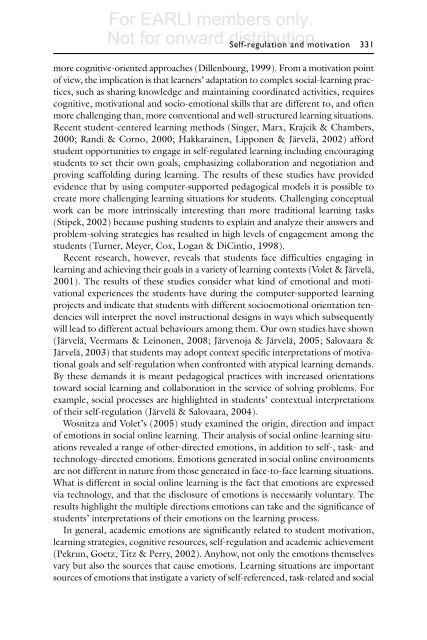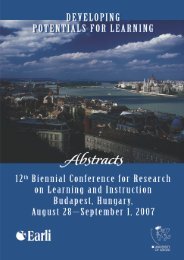Learning Across Sites: New tools, infrastructures and practices - Earli
Learning Across Sites: New tools, infrastructures and practices - Earli
Learning Across Sites: New tools, infrastructures and practices - Earli
Create successful ePaper yourself
Turn your PDF publications into a flip-book with our unique Google optimized e-Paper software.
For EARLI members only.<br />
Not for onward distribution.<br />
Self-regulation <strong>and</strong> motivation 331<br />
more cognitive- oriented approaches (Dillenbourg, 1999). From a motivation point<br />
of view, the implication is that learners’ adaptation to complex social- learning <strong>practices</strong>,<br />
such as sharing knowledge <strong>and</strong> maintaining coordinated activities, requires<br />
cognitive, motivational <strong>and</strong> socio- emotional skills that are different to, <strong>and</strong> often<br />
more challenging than, more conventional <strong>and</strong> well- structured learning situations.<br />
Recent student- centered learning methods (Singer, Marx, Krajcik & Chambers,<br />
2000; R<strong>and</strong>i & Corno, 2000; Hakkarainen, Lipponen & Järvelä, 2002) afford<br />
student opportunities to engage in self- regulated learning including encouraging<br />
students to set their own goals, emphasizing collaboration <strong>and</strong> negotiation <strong>and</strong><br />
proving scaffolding during learning. The results of these studies have provided<br />
evidence that by using computer- supported pedagogical models it is possible to<br />
create more challenging learning situations for students. Challenging conceptual<br />
work can be more intrinsically interesting than more traditional learning tasks<br />
(Stipek, 2002) because pushing students to explain <strong>and</strong> analyze their answers <strong>and</strong><br />
problem- solving strategies has resulted in high levels of engagement among the<br />
students (Turner, Meyer, Cox, Logan & DiCintio, 1998).<br />
Recent research, however, reveals that students face difficulties engaging in<br />
learning <strong>and</strong> achieving their goals in a variety of learning contexts (Volet & Järvelä,<br />
2001). The results of these studies consider what kind of emotional <strong>and</strong> motivational<br />
experiences the students have during the computer- supported learning<br />
projects <strong>and</strong> indicate that students with different socioemotional orientation tendencies<br />
will interpret the novel instructional designs in ways which subsequently<br />
will lead to different actual behaviours among them. Our own studies have shown<br />
(Järvelä, Veermans & Leinonen, 2008; Järvenoja & Järvelä, 2005; Salovaara &<br />
Järvelä, 2003) that students may adopt context specific interpretations of motivational<br />
goals <strong>and</strong> self- regulation when confronted with atypical learning dem<strong>and</strong>s.<br />
By these dem<strong>and</strong>s it is meant pedagogical <strong>practices</strong> with increased orientations<br />
toward social learning <strong>and</strong> collaboration in the service of solving problems. For<br />
example, social processes are highlighted in students’ contextual interpretations<br />
of their self- regulation (Järvelä & Salovaara, 2004).<br />
Wosnitza <strong>and</strong> Volet’s (2005) study examined the origin, direction <strong>and</strong> impact<br />
of emotions in social online learning. Their analysis of social online- learning situations<br />
revealed a range of other- directed emotions, in addition to self- , task- <strong>and</strong><br />
technology- directed emotions. Emotions generated in social online environments<br />
are not different in nature from those generated in face- to- face learning situations.<br />
What is different in social online learning is the fact that emotions are expressed<br />
via technology, <strong>and</strong> that the disclosure of emotions is necessarily voluntary. The<br />
results highlight the multiple directions emotions can take <strong>and</strong> the significance of<br />
students’ interpretations of their emotions on the learning process.<br />
In general, academic emotions are significantly related to student motivation,<br />
learning strategies, cognitive resources, self- regulation <strong>and</strong> academic achievement<br />
(Pekrun, Goetz, Titz & Perry, 2002). Anyhow, not only the emotions themselves<br />
vary but also the sources that cause emotions. <strong>Learning</strong> situations are important<br />
sources of emotions that instigate a variety of self- referenced, task- related <strong>and</strong> social
















